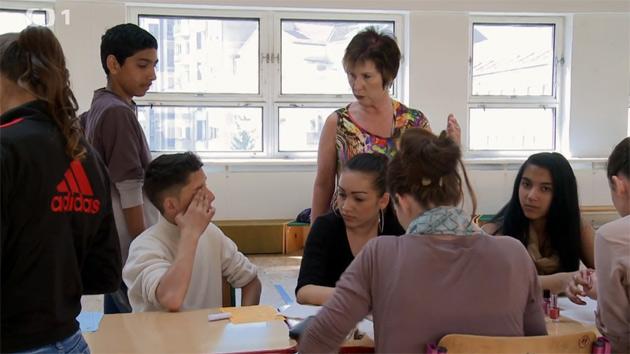Does the new Czech reality TV show frame Romani children as ineducable?

A new reality show called "Class 8 A" (Třída 8. A) has just been through its fifth Thursday episode before 10 PM on Czech Television’s channel 1. The show is a spinoff of the very successful Swedish program "Klass 9 A", where several charismatic teachers arrive to teach a class of immigrants and, after roughly half a year of duelling with cultural models and their pupils’ personal deficiencies, reach a happy ending as girls in headscarves and black guys with the crotches of their pants down by their knees fall into the arms of the Nordic-looking intellectuals/teachers.
This successful program has since been "copied" in several other countries, including Slovakia, always with a more-or-less similar happy ending. However, the Czech version (or to be more precise, the Brno version) is different.
In the Czech version the program’s generally positive aspects are still featured – it makes education a publicly discussed topic, shows teachers as "heroes" (sometimes genuinely so), and directly shows the audience what teachers today have to know how to deal with as normal occurrences. The difference is that the school featured, which is located near the center of Brno, is, with the exception of two or three children, an all-Romani school.
The online discussion between viewers taking place on the program’s website revolves almost exclusively around whether the teachers shouldn’t be stricter with the Romani "slobs", whether the pupils don’t belong in an auxiliary ("practical") school, whether they are being graded too generously, whether they deserve any education at all, and whether they shouldn’t just be sent straight to manual labor. In the Czech context the online debate is remaining rather cultivated, for the time being, but I believe it would be a good idea for viewers to realize a few things before watching the next episode.
Do not be confused by the uniform skin color of those in the classroom. It is true that the audacity, the carelessness, and the minimal motivation of some of the pupils we see there are all above-average.
However, truth be told, teachers usually grapple with these same phenomena even in a non-Romani class, just in a bit less exaggerated of a form. Intractability is definitely not a problem of Romani pupils only.
Moreover, isn’t it alarming that an all-Romani class could arise in the Czech Republic in the first place? In the Swedish program there were many immigrants in the classroom, but it was not as monocultural as this classroom is.
In the Czech schools, unfortunately, the number of classes with selected children and "selected" children in them is rising ever more rapidly and we are not doing much to change it. All we are doing is being offended by those "others".
Even Komenský, the father of modern education, would probably fail in such a class. This is not the problem of either the children or the teachers, but of a system that allows something like this to happen in the center of the country’s second-largest city.
Isn’t it odd, in the Czech program, that the teacher is completely alone in this environment? A teaching assistant does walk around the classroom, but it definitely doesn’t look like she is helping the teacher handle the situation.
In Sweden, where the class was much calmer, two full-fledged teachers were often sent to work with them at the same time. This was done precisely so that the instruction would not degenerate into a session about taming wild animals.
Sending two teachers to a class never takes place in practice in the Czech schools. Morevoer, isn’t it also odd, in the Czech case, that these three "best teachers sent to the worst school" are so suprised by what they encounter there?
All three are above-average in their reflections on their profession, on how to get children’s attention and motivate them, but it seems they are all probably having their very first experience with an unmanageable classroom now, on camera. Shouldn’t a qualification in that area have been part of how they earned their degree?
Shouldn’t every teacher first experience such a classroom in the role of assistant teacher? Lastly, are all Romani children really identical and ineducable?
In that respect the Czech program is good, because in addition to showing the eighth-graders in the classroom, where they are occasionally getting away with murder, we also see them in one-on-one interviews before the camera. Suddenly we see them not as a lazy mob, but as specific, very different people with emotions and fears who would basically like to be better than they are, but are taking a bit of circuitous route to get there; up close, the Romani kids no longer seem like an ineducable bunch, but like people whose flaws we rather understand, on both a personal and a more general level.
For the time being all the other versions of this reality show have ended optimistically. Will the Czech one do so?
I doubt it, and the choice of a Romani class does not strike me as having been completely fortunate. However, the creators definitely deserve praise for one thing: The program raises very unpleasant questions for our previous, current and future Education Ministers.
First published in RESPEKT magazine.